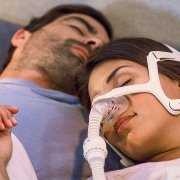Your CPAP Mask Can Make You Sick
The CPAP has some “creature features” to make it more comfortable to use. In particular, the heated humidifier and heated tubing may make the air more warm and moist. This decreases mouth and nose dryness, which may actually reduce the risk of potential infection, and improves tolerance to the therapy. (Inflammation along the airway often improves with CPAP use, in fact.) However, there are organisms that also love a warm, humid environment. In particular, fungus, yeast, and mold would love to hang out in such a place.
If your CPAP is not kept clean and excess moisture is allowed to sit in the tubing or humidifier, you might be at risk of developing a fungal or yeast colonization.
Dangerous molds could also establish themselves in the equipment. These organisms could potentially be harmful to you. This may lead to irritation of the airways and lungs, contributing to cough or possibly even an infection like bronchitis, pneumonia, or inflammation of the lungs called pneumonitis. The air pressure may blow these organisms directly into your lungs. It sounds scary!
If water is left in the device for an extended period of time without use, mold is more likely to form. Therefore, the device should not be stored with water left in it, especially in an environment that might promote such growth (like leaving the CPAP in a shed or garage for months or years and then resuming its use).
How to Avoid Infection
In order to reduce the risk of infection or exposure to unwanted fungi or molds, there are certain steps that you can take.
- Make sure to clean your CPAP as often as you should with hot water and dish soap. The equipment manufacturers suggest daily cleaning. In actual practice, it is recommended that this be done at least weekly, depending on your environment. It is not necessary to use an expensive CPAP sanitizer device to reduce the risk of infection that is simply not there.
- If you are sick with a cold or flu, clean your mask, tubing, and device thoroughly to remove mucus and other undesirable residual discharges from the illness. This basic hygiene can help to avoid any unpleasant smells from developing.
- Do not let water or moisture remain in the equipment for prolonged periods (more than a few days unused) and use a heated humidifier and heated tubing to reduce condensation. If you decide to stop using the treatment for longer than a few days, clean and dry it out completely. Modern devices are also able to circulate air to help dry out the tubing after use has concluded.
- Use distilled water in the humidifier to reduce your risk of infection by amoeba in certain regions such as Louisiana. If you don’t trust the local water supply, always err on the side of using distilled water. This can also avoid the accumulation of minerals inside the water chamber.
- Replace your supplies, including machine filters, as often as you should. Filters have been shown to reduce the spread of bacteria within the device. Masks should be replaced at least every 3 months and filters and mask cushions (the part that touches your face) should be changed from every 2 weeks to monthly.
Do not share your equipment with others to prevent the spread of infection. Do not purchase or accept used equipment, especially used masks and tubing.
By taking these simple steps, you can further reduce the risk of infection and ensure that you get the healthful benefits you expect from your treatment.
Article reproduced from published in verywellhealth.com

 aeroflowinc.com
aeroflowinc.com





